A Pakistani ethnic Pashtun rights group on Sunday staged its first rally in the southern city of Karachi, the site of a killing in January that sparked the movement and led to nationwide protests and rallies.
The Pashtun Tahaffuz Movement (PTM) emerged after the January killing by police of Pashtun youth Naqibullah Mehsud in Karachi.
A crowd of several thousand people gathered for the rally on Sunday in Karachi's outlying Sohrab Goth suburb.
The PTM has said several thousand such killings have been carried out since Pakistan joined the U.S.-led war on terror and launched major military operations in 2009 and 2014 targeting Pakistani Taliban strongholds in the Pashtun majority Federally Administered Tribal Areas (FATA) areas bordering Afghanistan.
Hundreds of thousands migrated to Karachi after the military operations, where the largest population of Pashtuns in Pakistan lives.
Among the crowd of protesters were families of missing persons, holding pictures of their loved ones who they say were taken by security officials.
The families say they have not received any information since the disappearances, some of them more than a decade ago.
The PTM estimates there are over 5,000 such cases.
"PTM was born out of the incident that happened in Karachi," Mohsin Dawar, one of the group's founders, told Reuters.
"The trauma and pain the Pashtuns of the FATA have experienced, the Pashtuns of Karachi have gone through a similar experience," he said.
Officials from Pakistan's paramilitary Rangers, which are part of the security forces, did not respond to request for comment.
The PTM leader Manzoor Pashteen's popularity has surged amongst Pashtun youth. Some of the protesters wore the red and black patterned hat, which has become Pashteen's trademark, as they waited for him to arrive at the rally.
But Pashteen did not board his flight from Islamabad to Karachi on Saturday morning and a representatives of local airline Serene Air said his booking had been cancelled, Dawar said.
A Serene Air representative was not immediately available for comment.
Dawar said Pashteen and three other PTM leaders had started on the more than 20-hour drive from Islamabad to Karachi but they were stopped several times along the way.
"He has been stopped and detained for hours several times," Dawar said.
Speakers at the rally said they would not leave until Pashteen arrived.
"We demand that security officials themselves bring Manzoor Pashteen here before our rally ends," PTM member Sana Ejaz said.
After sunset, the protesters held up cellphone flashlights, refusing to move until Pashteen turned up.
Pakistani ethnic rights group stages first rally in Karachi
Pakistani ethnic rights group stages first rally in Karachi
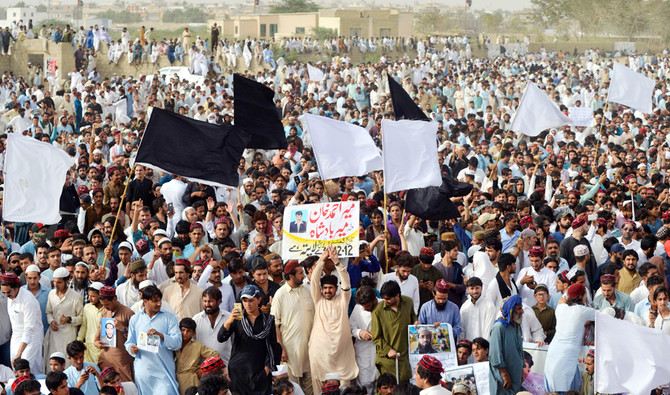
- "PTM was born out of the incident that happened in Karachi," Mohsin Dawar, one of the group's founders, told Reuters.
- The PTM leader Manzoor Pashteen's popularity has surged amongst Pashtun youth
Pakistani media regulator bans TV channels from airing news on ongoing court cases
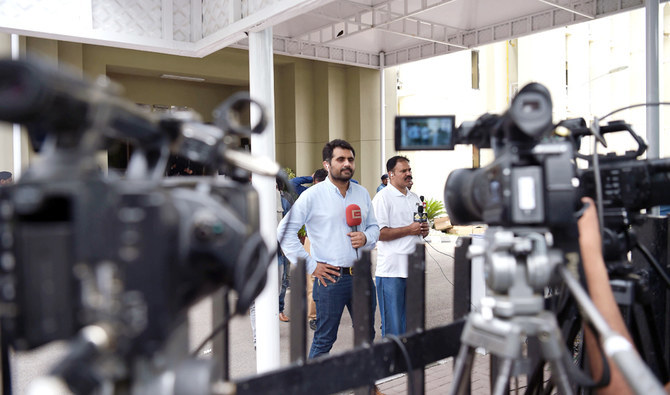
- Authority directs TV channels to report only written orders of courts, refrain from airing news related to court hearings
- Journalists’ associations reject directives, call on Pakistan Electronic Media Regulatory Authority to withdraw notification
ISLAMABAD: Pakistan’s media regulatory body has banned TV channels from airing news, opinions, and commentary on proceedings of ongoing court cases, prompting journalist associations on Wednesday to reject the directive and call it a violation of the country’s constitution.
The development takes place amid tensions between the government and the Islamabad High Court over the alleged kidnapping of Kashmiri poet Ahmad Farhad last week. The poet’s family has accused Pakistan’s Inter-Services Intelligence spy agency of abducting Farhad from his Islamabad residence for his critical social media posts that targeted the military.
Media extensively reported on the case’s hearings this week as the high court directed authorities to produce the missing poet within four days, warning it would otherwise summon senior government officials. The court also criticized Pakistan’s intelligence agencies, prompting the law minister to say on Monday that the court’s comments were “shocking.”
Journalists in Pakistan have spoken of growing press and media censorship, with many blaming Pakistan’s powerful military for illegally detaining journalists and torturing them. The military has repeatedly denied the allegations.
“TV channels are directed to refrain from airing tickers/headlines with regard to court proceedings and shall only report the written orders of the court,” a notification from the Pakistan Electronic Media Regulatory Authority (PEMRA) said on Tuesday.
The regulator also directed TV channels to air “no content including commentary, opinions or suggestions about the potential fate of sub judice matter which tends to prejudice the determination by a court, tribunal.”
However, PEMRA allowed TV channels to report on court proceedings if they were broadcast live by the judiciary.
Journalists’ associations covering Pakistan’s Supreme Court and the IHC rejected the directives, saying it was in violation of the country’s constitution.
“Both the journalists’ associations covering court proceedings reject PEMRA’s notification while terming it against press freedom and independent judiciary,” the Press Association of the Supreme Court (PAS) and the Islamabad High Court Journalists Association said in a joint statement on Wednesday.
“PEMRA has no legal right to ban coverage of court reporting,” the statement said, adding that the regulator’s notification was a “serious violation” of journalists’ rights enshrined in the constitution.
The associations demanded that PEMRA withdraw its notification, warning that they would otherwise challenge it in court.
Pakistan to enhance production of indigenous petroleum products— minister
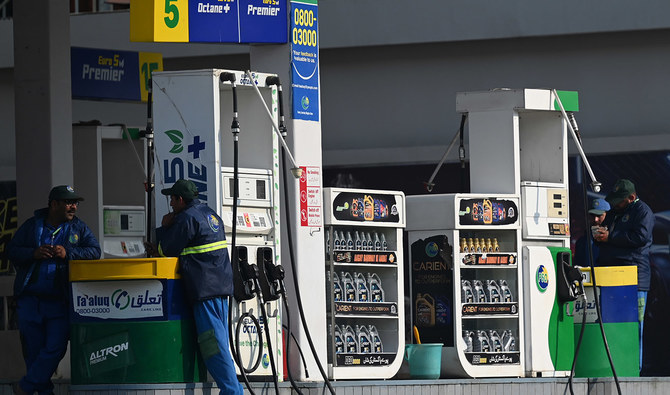
- Cash-starved Pakistan spends over $20 billion each year on petroleum imports to meet energy demand
- Pakistan welcomes foreign companies to invest in its oil and gas sector, says Petroleum Minister Musadik Malik
KARACHI: Pakistan wants to enhance the production of its indigenous petroleum products, Petroleum Minister Musadik Malik said on Wednesday, citing the financial burden that expensive crude oil imports have on the country’s fragile economy.
Cash-strapped Pakistan relies heavily on imported petroleum products as its energy demands grow. Struggling with a balance of payments crisis, high inflation and steep currency devaluation, Pakistan is looking to secure cheaper energy imports and find alternate ways to lessen the cost of power generation.
According to the Trade Development Authority of Pakistan (TDAP), the country’s indigenous oil production meets only about one-fifth of Pakistan’s current oil needs. The rest is met through high-cost imports.
Prime Minister Shehbaz Sharif has urged the government to turn toward renewable energy resources. Last month, he said the country currently imports oil worth $27 billion to meet its power and transportation needs, which puts a strain on the cash-strapped nation.
Speaking at the Pakistan Energy Symposium, Malik said it would be difficult to manage the country with such a huge energy import bill when Pakistan’s exports were around $30 billion.
“We want to first of all, produce as much of the petroleum products, including gas and crude, indigenously as much as possible,” the minister said, adding that the government has put blocks for bidding and is actively trying to attract global players in exploration activities.
Malik said the government is expediting oil and gas exploration within the country, adding that it welcomes foreign companies to invest in the sector.
“So, we are telling the world that Pakistan is open for business, our regulatory process, particularly the petroleum concession process is very dense and opaque,” he said.
He said investment processes and information about oil and gas exploration have been digitized and simplified to facilitate the government’s aims to enhance indigenous production of energy resources.
Malik advocated for increasing the utilization of Pakistan’s abundant renewable energy resources, pointing out that the country’s solar energy costs have significantly decreased.
PM Sharif demands industry status for Pakistan’s gemstones sector
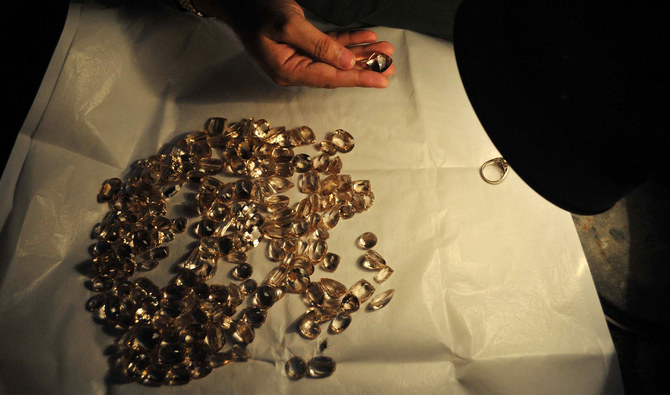
- Pakistan’s exports of gems and precious stones to China saw 47 percent increase in 2023, as per official figures
- Pakistan possesses immense natural resources in KP, Gilgit-Baltistan and Azad Kashmir regions, says Sharif
ISLAMABAD: Prime Minister Shehbaz Sharif on Wednesday stressed developing the country’s gems and precious stones sector, urging authorities to take steps to accord it the status of an industry, a statement from his office said.
According to a report by Pakistan’s Ministry of Commerce, the country’s exports of pearls and precious stones to China saw a 47 percent increase in 2023, showcasing the rising demand for Pakistan’s precious stones in China.
“The prime minister gave directions for steps to be taken for the gems and precious stones sector be granted industry status,” the PMO said, as Sharif chaired a meeting of the gems and private stones sector in Pakistan’s capital on Wednesday.
Sharif said Pakistan possesses immense natural resources, particularly in the regions of Khyber Pakhtunkhwa, Gilgit-Baltistan, and, Azad Jammu and Kashmir. He called on authorities to properly utilize these resources to Pakistan’s advantage.
“Efforts should be made to obtain international certifications for precious stones and the products made from them, and to ensure Pakistani representation in global exhibitions,” the prime minister said.
He directed necessary consultations to be held with the private sector and provinces in this regard.
Separately, the prime minister also presided over a meeting on Information Technology Parks, directing the construction of Islamabad IT Park “as soon as possible.”
The Islamabad IT Park is expected to act as a state-of-the-art facility that would aim to foster collaboration, innovation and product development in teh capital.
“The establishment of IT parks to promote IT, increase IT exports, and provide facilities to startups is a welcome development,” PM Sharif was quoted as saying by the PMO.
Sharif was told during the meeting that the Islamabad IT Park would be completed next year in collaboration with South Korea.
“The Islamabad IT Park will feature startups, incubation centers, banks, restaurants, and other facilities,” the statement said.
Babar holds key for success as unpredictable Pakistan gear up for World Cup
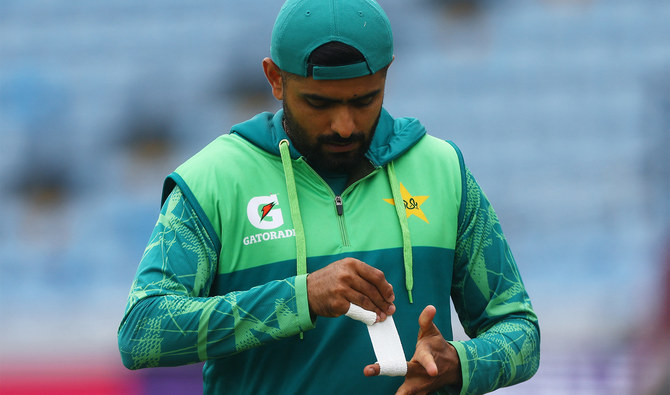
- Pakistan has experienced massive changes in its cricket board since T20 World Cup 2022
- Pakistani batter will be first person to lead a team for first time in three successive World Cups
ISLAMABAD: The return of tried and tested Babar Azam as captain for the Twenty20 World Cup belies the massive changes in Pakistan cricket over the last 18 months.
Since Babar’s team lost the T20 World Cup final to England in November 2022, the Pakistan Cricket Board has had four chairmen, the selection panel has been overhauled, and the experiment with Shaheen Shah Afridi as skipper was quickly aborted.
A new head coach for the limited-overs formats joined the squad in England just weeks ahead of the June 1-29 World Cup in the US and Caribbean.
And to top it off, Pakistan will be the last team to confirm its 15-member World Cup squad as it continues to experiment with various combinations.
Babar is urging supporters to be patient, and there’s a plan in place for success.
Babar stepped down from all-formats captaincy during the tenure of Zaka Ashraf as head of the PCB after Pakistan failed to qualify for the semifinals of the 50-over World Cup in India last year.
But he was reinstated as T20 captain by Mohsin Naqvi — the fourth PCB chairman in less than 14 months — ahead of home series against New Zealand in April after Afridi lost the series in New Zealand 4-1.
Allrounder Imad Wasim and fast bowler Mohammad Amir came out of international retirement in the hope that their experience of playing in the Caribbean Premier League will benefit Pakistan in the West Indies.
South African Gary Kirsten, who was appointed last month as head coach, will gain some first-hand knowledge of the Pakistan squad during a four-match series in England that both teams are using to rehearse for the World Cup.
All these off-the-field happenings have impacted Pakistan’s preparations for the tournament.
It badly lost the away series to New Zealand, scraped to a drawn 2-2 series at home against the Black Caps and lost a T20 series against Afghanistan 2-1. A shock loss to Ireland in Dublin preceded back-to-back wins and 2-1 series result.
And so unpredictable Pakistan enters another world tournament as a team to watch because of its rich history in the T20 World Cup. It has featured in three finals, winning the title in 2009, and also reached the semifinals three other times.
One of Kirsten’s coaching tips has already resonated with the players.
“Gary told us, don’t play for the name on the back of your jersey but for the badge in front of your shirt,” Afridi told a PCB podcast. “And that stayed with me.”
The depth in its pace bowling, with the likes of Afridi, fit-again Haris Rauf, Naseem Shah and Amir, can pose a threat to any team. But Pakistan’s top-order batting was still unsettled going into the series in England. Left-hander Saim Ayub is yet to fire in his role after selectors decided to separate the successful T20 opening pair of Babar and Mohammad Rizwan.
Babar has faced criticism for not pushing the scoring rate in the T20 power play, particularly while batting first. Pakistan has mostly aimed for totals in the 170-180 range while other teams have crossed 200 on regular basis.
Political tensions between Pakistan and India means there hasn’t been a bilateral series for over a decade, but the ICC tournaments always attracts a huge TV audience when the archrivals meet.
Pakistan and India will play a group game on June 9 at a newly built 34,000-capacity Nassau County International Cricket Stadium in New York that will be the center of attention for South Asian communities.
Both teams are expected to advance to the Super 8 stage from a group that also contains tournament co-host US, Canada and Ireland.
Babar has twice gone close to lifting the trophy as captain, losing to eventual champion Australia in the 2021 semifinals and to England in the final in the Melbourne final the following year.
And for that, he’ll get the distinction of becoming the first player to lead a country in three successive T20 World Cups and will be aiming for third time lucky if his Pakistan lineup can reach the June 29 decider in Barbados.
Saudi aid agency distributes 9,000 shelters, non-food items among Pakistan’s flood-hit families
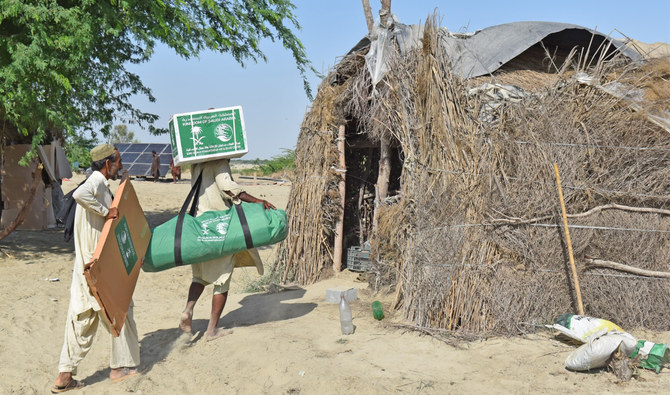
- The relief kits containing solar panels, blankets, kitchen sets, water coolers and soaps will benefit 63,000 individuals
- These items have been distributed among people of Upper Dir, Lower Chitral, Swat, Gwadar, Chaghi and Pishin districts
ISLAMABAD: The King Salman Humanitarian Aid and Relief Center (KSRelief) announced on Wednesday it has distributed 9,000 shelters and non-food items to flood-affected families in Pakistan’s two western provinces to meet the needs of people affected by recent rains.
The death toll from rain-related incidents in Pakistan’s Balochistan and Khyber Pakhtunkhwa (KP) provinces surged to 78 last month.
Heavy rains in these provinces inundated the streets of several districts, damaging thousands of houses. The casualties included at least 33 children and 15 women, while many others were also injured and displaced.
“These relief kits, containing vital items such as shelters, solar panels, blankets, plastic mats, kitchen sets, water coolers, and antibacterial soap provided comprehensive support to 63,000 individuals,” KSRelief said in a statement.
The Saudi aid agency added the “vital assistance during this critical time” would benefit flood victims in Upper Dir, Lower Chitral, Swat, Charsada and Dera Ismail Khan districts of KP and Gwadar, Chaghi and Pishin districts of Balochistan.
“This initiative was executed in close collaboration with the National Disaster Management Authority and the respective provincial governments of KP and Balochistan through the Hayat Foundation,” the statement concluded.










